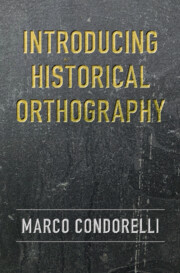Book contents
- Introducing Historical Orthography
- Introducing Historical Orthography
- Copyright page
- Contents
- Figures
- 1 Introduction
- Part I Origins and Sources
- Part II Elements of Orthography
- Part III Analysing Orthography
- 6 Investigative Approaches
- 7 Representation and Interpretation
- Part IV Understanding Orthography
- Bibliography
- Index
- References
6 - Investigative Approaches
from Part III - Analysing Orthography
- Introducing Historical Orthography
- Introducing Historical Orthography
- Copyright page
- Contents
- Figures
- 1 Introduction
- Part I Origins and Sources
- Part II Elements of Orthography
- Part III Analysing Orthography
- 6 Investigative Approaches
- 7 Representation and Interpretation
- Part IV Understanding Orthography
- Bibliography
- Index
- References
Summary
Chapter 6 introduces a number of key methods and frameworks of analytical inquiry for approaching historical writing systems, including traditional approaches and more recently developed perspectives which lean towards a comparative approach. The first focus area explored in the chapter is that of philology: the chapter discusses how far philological approaches pertain to the study of orthography. The discussion also focuses on facsimiles and transcribed material for empirical analysis, while also pointing to the limitations stemming from digitally driven methods of research inquiry. The chapter discusses in particular the intratextual, intertextual and cross-textual analytical approaches, each of which has inherent advantages and disadvantages. The discussion then focuses on an overview of recently developed empirical frameworks of enquiry in historical orthography for a synergic perspective. Relevant topics in this section include, but are not limited to, comparative graphematics, which refers especially to the comparative analysis of individual orthographic units (e.g. punctuation features); and biscriptality, which includes bigraphism, biorthographism and bygliphism.
- Type
- Chapter
- Information
- Introducing Historical Orthography , pp. 105 - 125Publisher: Cambridge University PressPrint publication year: 2022

